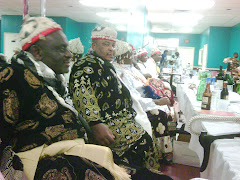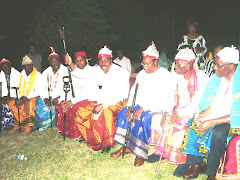
Dear Brothers, Sisters and Folks,
It is difficult to find the right words to describe what I and a delegation of Cameroonian Ekpe members from the Ekpe DC Lodge saw and felt in New York on September 5th, 2009. Two hundred years of separation from our brothers and sisters in Cuba, caused by the vices of the slave trade came to a crashing halt on this blessed day in New York.
It all started with two groups of curious cultural researchers from the Island of Cuba, in the Caribbean, and Cameroon, in Africa, trying to trace back their origins. While the Cubans traced the first phase of this great culture to the Old Calabar region in Eastern Nigerian, the Cameroonians from the Washington DC Ekpe Lodge went looking for people with similar cultures all over the World. The Ekpe Washington researchers discovered that Cuba had a similar culture as theirs called Abakwa with signs, rites and music identical to the Cameroonian Ekpe or Ngbe. They further discovered that this Abakwa was the origin of Merengue, Pachanga widely known in the world today as Afrocuban music. The Researchers from the Ekpe DC Lodge in the quest for more information found out the addresses of the leaders of the Cuban Ekpe lodges in the United States and Cuba. After a series of correspondences between the two groups, the Cubans invited the Washington Ekpe Lodge to New York to the unveiling of their latest Ekpe Album which attracted over 500 Cubans to the Joe's Pub in Uptown Manhattan, New York..As members of the Washington Ekpe Lodge started getting ready to go to New York, the Cuban Abakwa leaders informed their community that their long lost relatives from Cameroon, the place where Ekpe originated, the original custodians and chiefs of the "Nyamgkpe" society were coming to town. Never have I felt such reverence as I felt on that day, a feeling that was quickly echoed by the score of members in the delegation. You had to have been there to fully appreciate seeing the numbers cameras, camcorders and Television cameras flashing non-stop in a “red-carpet” welcome, as this team of tigers from Manyu walked majestically towards the waiting crowd in hall which was now close to mass hysteria. As we proceeded through the ovation-standing crowd, the Abakwa chants (Cuban Ekpe music) were roaring through the speakers accompanied by thunderous drums and claps. As we glided towards our assigned seats in characteristic Ekpe fashion, the announcer pronounced the name of the leading tiger, "Sisiku Ojong Orock", then Sisiku Joseph Mbu, and continued down the list according to the ranks of members of the delegation.

As the night went on, the Abakwa band kept singing praises to the mighty Ekpe society in Spanish except when they were using purely Ekpe language, or when they were naming the various villages in the Cross River region of Cameroon and Nigeria where Ekpe originated. Then suddenly, the Cuban "Emanyankpe" emerged, accompanied by the chanting drummers in a language only understood by the Ekpe members. That moment will be engraved in history forever, as it marked the exact moment when a 200 year separation of two brothers by the result of slave trade finally came to an end. It engraved in history one of the most precious accomplishment of this generation of Cameroonians as they finally tracked down their displaced relatives from the Cross River region. As the Emanyangkpe danced towards the table where the Cameroonian Ekpe members were sitting, Tata Ngbe, Haywood Mbu advanced towards the Ema and gave the tiger salute to the amazement of everyone watching.
The magnitude of this discovery became all too evident when the Cuban Emanyangkpe kept taunting members of our delegation, bumping his chest to theirs in the traditional Ekpe salute. As he went around the first time, we all responded and greeted him, chanting praises to the Ekpe of our common ancestors. As he came around the second time, he bumped chest with our own “Obenny”, the "Ewunjem" from Sabes, and perhaps our most gifted Ekpe performer. As is always the case with those children bestowed with “the gift of Ekpe”, Obenny turned around and started mimicking every move that the Cuban Emanyangkpe made. He then turned around and started demonstrating his own Ekpe moves, and the Cuban Emanynagkpe mimicked the same moves. By this time, everyone in the Ekpe DC delegation had joined in and the crowd had gone wild. You could barely hear the music in the background because the volume had been over shadowed by the cheers and screams from the Ekpe people dancing in orchestration, with Cuban sisters and brothers weeping, overcome by the joy of being part of history. A historical event that finally showed them where they came from. Some explained, between tears of joy, that they only learned in school that their tradition came from Cameroon but were never sure that they would live to see people from their ancestral land, live, in flesh and blood.
The event lasted about three hours, and as we prepared to leave after the closing of the hall, the Cuban Ekpe members stopped us and continued outside with a libation of last "mimbo" by our leader, Sisiku, Ojong Orock, and their Cuban Grand Master, Ecubio.
As we drove back to Maryland, the importance of this accomplishment dawned on us. Members of this generation of Manyu Elements, through the study of Ekpe and a review of ancient Ekpe Archives have rediscovered their relatives who where involuntarily plucked from the cross river region and sold into slavery in Cuba. We had just closed all the gaps in one of the greatest cultural historical puzzles of our time.
Long Live Manyu,Long Live Cuba,Long Live Cameroon,
Sisiku Joseph N. MbuEkpe Washington DC Metropolitan Lodge.
















No comments:
Post a Comment